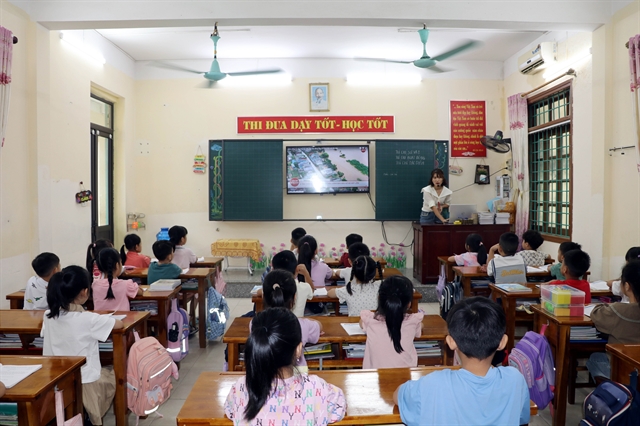 Society
Society


|
| A primary school lesson at Lý Tự Trọng Primary School in Ninh Bình City. — VNA/VNS Photo |
HÀ NỘI — The Ministry of Education and Training has proposed abolishing school suspensions as a disciplinary measure for students, a move that would represent the most sweeping reform of school disciplinary policy in nearly four decades.
Under a draft circular that is currently seeking public feedback, students who violate school rules would no longer face suspension. Instead, the most serious consequence would be writing a self-critical statement.
The proposed changes apply to all students above primary level and aim to encourage self-awareness and personal growth, rather than punishment.
For primary school pupils, only two disciplinary measures are proposed, including reminders and formal apologies. Any disciplinary action at this level would not be recorded in school files or academic records.
This marks a major departure from the current framework issued in 1988, which still governs discipline and rewards in schools. That regulation permits public reprimands, warnings before the school, suspensions of up to a year and expulsions.
In 2020, the ministry scrapped public reprimands under new school regulations, making temporary suspension, typically lasting one to four weeks, the most severe measure. If the newly proposed rules are approved, even this would be eliminated.
The ministry says the revised approach to discipline is designed not just to deter misconduct, but to guide students toward positive behaviour.
Disciplinary measures should help students recognise their mistakes, take responsibility and strive for self-improvement, the ministry said.
The draft also stresses the need for fairness, respect and empathy, with schools instructed to consider each student’s psychological development, gender, physical condition, family background and regional cultural differences. Measures that are violent, demeaning or harmful to a student's well-being are strictly prohibited.
In addition to disciplinary measures, the draft circular outlines updated forms of student recognition. These include praise before class or the whole school, certificates of merit from the principal and letters of commendation.
The ministry encourages schools and external organisations to use other appropriate forms of reward to motivate students.— VNS




